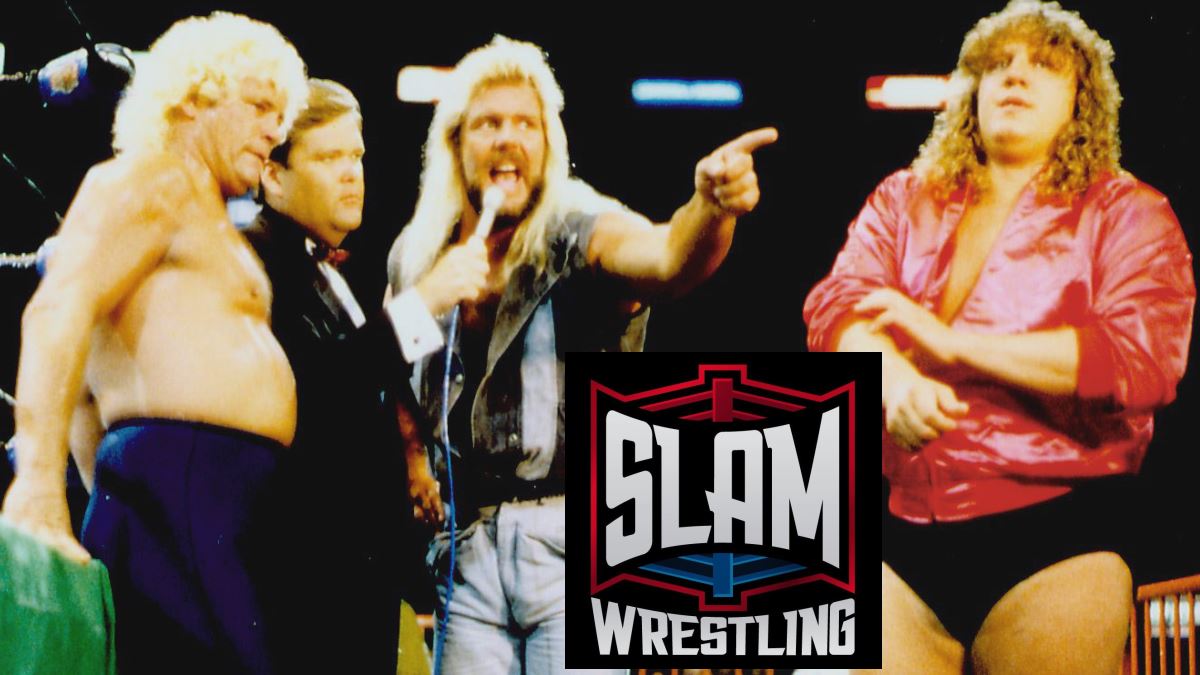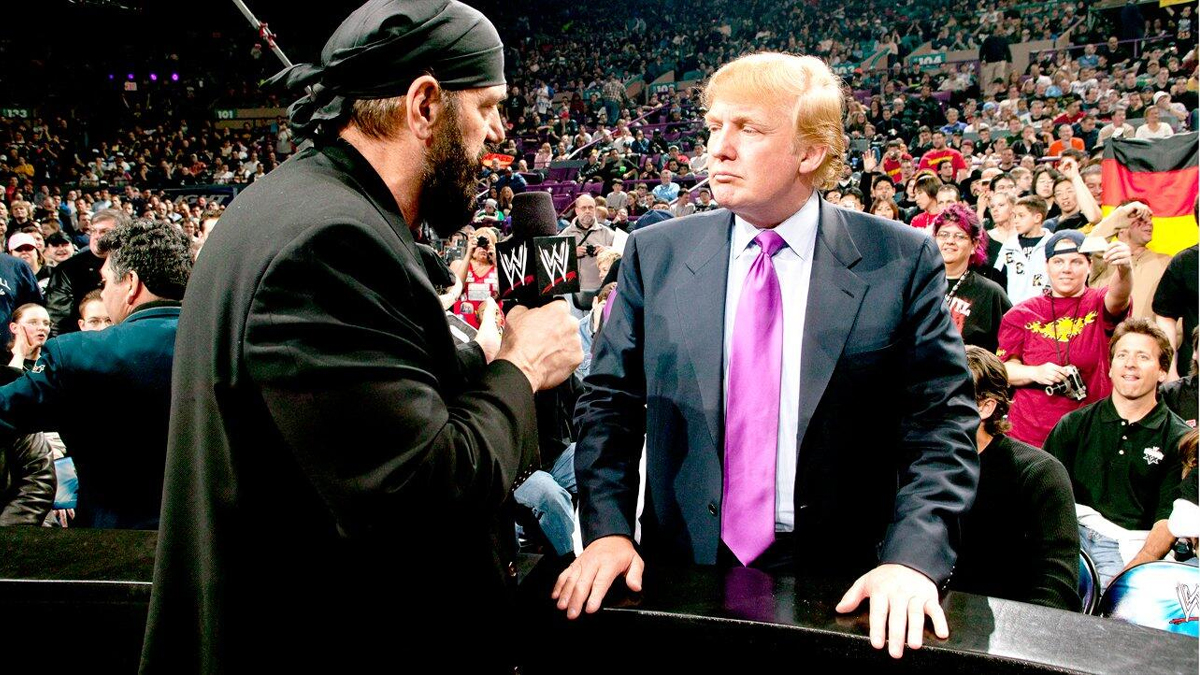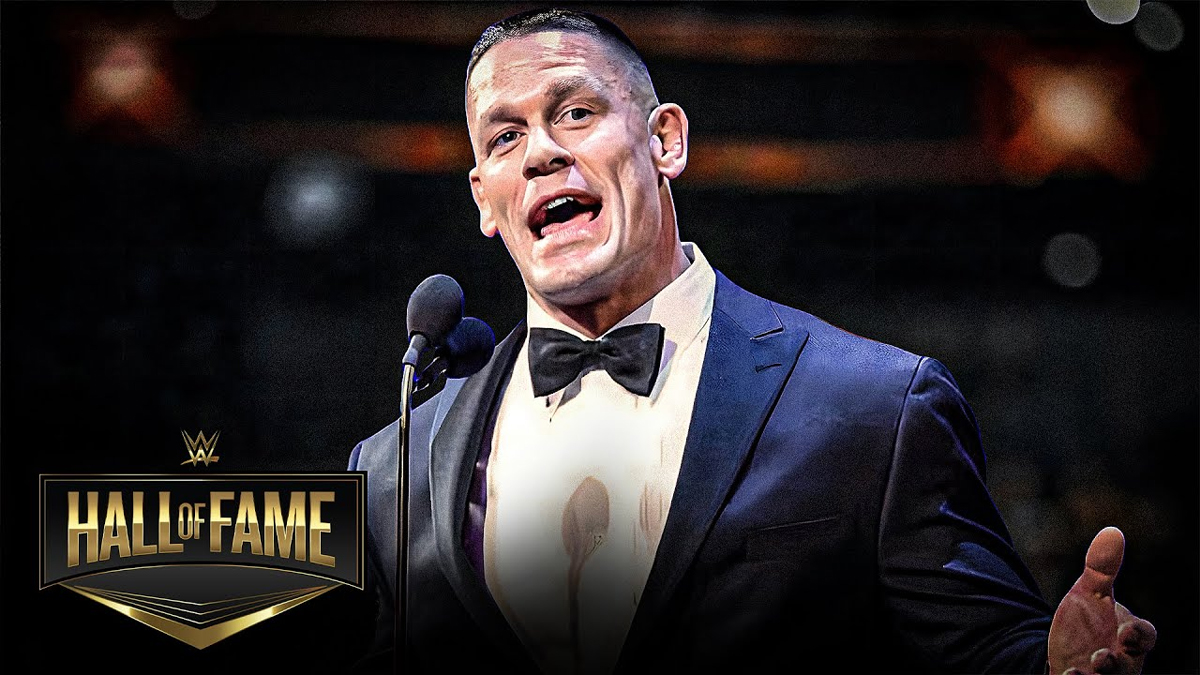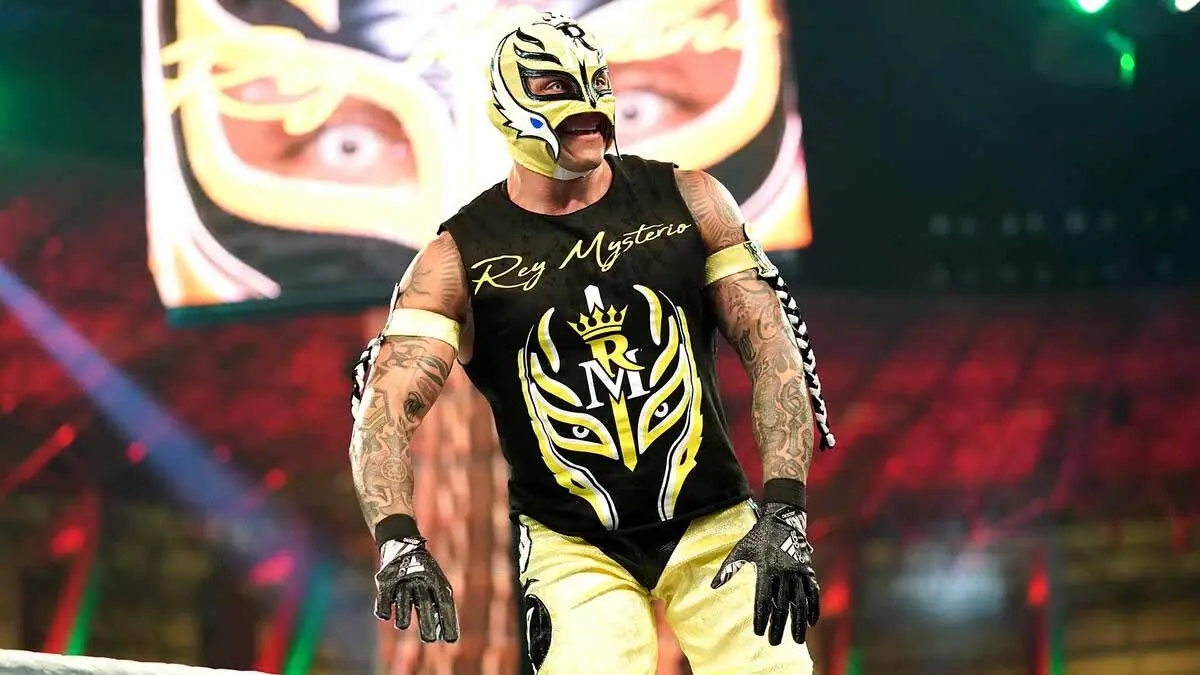In the ’80s, wrestling events in Texas were like rock concerts.

And if ever World Class Championship Wrestling had a rock star, it was Michael “P.S.” Hayes, leader of the Fabulous Freebirds.
With his long mane of blonde hair, flashy robes, and rock and roll swagger, Hayes, along with Terry “Bam Bam” Gordy and Buddy “Jack” Roberts ushered in a new era in professional wrestling.
Earning their nefarious reputation around the world for their legendary rivalry and violent bloodbaths with the fabled Von Erich family, the Freebirds were instrumental in making World Class one of the hottest territories in the country.
Hayes was also a pioneer at this time, breaking down barriers and recording the song “Badstreet U.S.A.” for their entrance theme, making the Freebirds the first wrestlers to use original entrance music as they came through the curtain.
Highly influential and innovative, Hayes was awarded the Lou Thesz Award earlier this month at the Cauliflower Alley Club banquet in Las Vegas, Nevada. Just hours before the award presentation, Hayes chatted at length with SLAM! Wrestling.
Below is part two of our interview, in which Hayes, who currently works backstage for WWE, discusses wrestling’s former territorial system, the Legacy of the Freebirds, and Hayes’ life as a “classic artist.”
SLAM! Wrestling: You have a reputation for being creative in a business where, frankly, it seems like everything has been done to death. What are the sources of that creativity, and how important is it to keep things fresh as opposed to using time-tested formulas?
Michael Hayes: First of all, if you have a dream you’ve got to go after it. I mean, I think when I tried to start pursuing my dream, the chances were, god darn maybe one percent, you were going to make it. But that one per cent was all I wanted, because that was one percent more than I had when I started. And if I can get from zero to one then I can get from one to two. If I can get from one to two then I can get from two to four.
And it’s just determination and a willingness to not be stopped. And it’s not so much about not failing, you’re gonna to fail along the way, but it holds kind of true to your dreams. And also, and this is gonna sound kind of hypercritical but, you also have to be amendable to things. You got to know what hills to die on. But more than anything you just got to go for it, go for broke, and then if it doesn’t work then you have nothing to be ashamed of. Your heart may be broke, but in time you’ll go, gosh dangit, I gave it all I had, so shit, that’s it, I did it and I have no regrets.

Because I’m the kind of guy I can’t stand what ifs. Forget what ifs, screw what ifs, just go, and you know what, win or lose you’ll be a better person for it.
SLAM! Wrestling: Can what worked in the territorial era work today, or are crowds so different that the psychology must also be different?
Michael Hayes: There’s a couple things there. One would be — just going back to your last question about kids and what they should do — the kids today, their athleticism far surpasses anything that most of us ever did. We had a few that were in that high echelon that could probably keep up with the kids of today, but the moveset is just not to be believed. With that said, what they don’t do in my opinion is they don’t learn how to captivate an audience. Some of them are almost scared to try to captivate and audience and they are somewhat scared of the audience. And it can’t be that way.
Because, see, I’m a tell ya, you can go all the way back in time and it takes you back to the territorial days, but you can have a great wrestler and if he or she was a mediocre talker, I’m going to tell you what’s going to happen. They’re just going to make mediocre money. But you can find a mediocre wrestler who is a great talker and he or she will make great money. And that never changed and it still won’t today.
And that’s why I don’t understand why kids don’t try to go out and perfect promos and talk that talk, and walk that walk, because everybody wants to be entertained. As fans, your lives are so hard working so you can to feed your kids, feed your wives, or whatever, and you want to escape and you don’t want to pay to see Bob the next door neighbour. And when everybody else is able to do these triple moonsaults then it’s not that special. But if everybody else can’t talk for three minutes and captivate people, and piss them off or make them happy, or get some emotion out of them, well then I don’t understand why so many kids don’t see that that’s the avenue to the pay window. And in the territorial days that’s what made it happen.
SLAM! Wrestling: In the territorial days, you had to constantly keep things fresh because you were wrestling in front of the same crowd every week, right?
Michael Hayes: Exactly, and that was one real disadvantage. I mean, it taught you to be creative. You didn’t come in once a quarter every year, once every six months and have 40 per cent of your audience checking it out for the first or second time, so you could not just go out and put on the same show, same stuff.

By the same token, one advantage was whatever you did stayed in that territorial area, wherever that TV reached, so you could take that, go to another place and do it all over again, and nobody was the wiser. Not such the case today, you fart on an airplane and it’s hittin’ social media, people are Tweeting all over the place.
SLAM! Wrestling: What were some of the traits a young Michael Hayes possessed or developed that still would be important for a wrestler today, especially as it relates to creativity?
Michael Hayes: I just kind of challenged myself and I loved it when people try to get on me, because that motivates my challenge, and you know sometimes no matter what you do, whether it’s musically or people who write books, you’ll hit a rut and that’s probably what bothers you. And what I’ve tried so hard to learn is that it’s just part of the cycle, because nine times out of ten, once you can just ride that rut a little bit and not lose your mind, or not lose it as much as you can, you’re going to come out into a great creative spurt.
And it just happens, I mean it’s like guys who write songs saying, “Well okay, I’m going to sit down and write a hit song right now, that’s what I’m going to do.” You know, it has to be a feeling, it has to come to you and it’s same thing with our business at times. At least for me, I’m a little bit streaky, sometimes I’m…even when I’m bad I’m good, but sometimes I’m not as good. And that bothers me because we all want to hit for the cycle and blast it over the fence, we’re not looking for a single, but sometimes you got to be okay with a single or a double, and quite frankly I’ll take a single and a double right now (laughs).
SLAM! Wrestling: Do you see yourself as an artist?
Michael Hayes: I do, in a different way. I’m a classic artist. Fortunately for me, I’ve never followed the rules. I pay attention to them, and I know where you can bend them and where not to break them, and I think that’s pretty much what most successful people do. You know when to push and when not to push, and that’s the fun of it, and then life evolves and life changes.
And part of that too is, and I don’t like to elaborate on this much, but working with Vince [McMahon] and all this young talent, I look back at that and I get a lot of enjoyment off of that. Like our last pay-per-view, Payback, when you see a pay-per-view like that and you see these kids put everything out there and it paying off, you feel good that you’re a part of that, a big part of it. Helping orchestrate it and getting it to work and calling a play. But those plays are only as good as the people running them, and at Payback the kids ran great plays and everybody wins. The fans win and the kids win because they feel great about themselves, when you make an achievement like that there’s no feeling like, there’s no high like that.

And I found another high in my life too, which is really cool, because I’ve had a lot of highs (laughs). This thing has been around forever, and I hadn’t tried it ’til recently and it’s called sleep. God darn, why didn’t someone tell me about that years ago. And it’s free! Wow. Getting a good night’s sleep and waking up, I mean, wow this is different.
SLAM! Wrestling: You’ve participated in several of the Legends of Wrestling roundtable shows on the WWE Network. What’s that experience been like?
Michael Hayes: It’s fun. I dig doing that. I watch it back sometimes and think, wow, I’m really an asshole. And you’re good at it too! That’s kind of my job on the show. We had Kevin Nash on the show one time and he was fantastic, the stories he told about WCW, during the (Monday Night) war, and we were just about to wrap up and I go, “Whoah whoah whoah, what about the Arn Anderson parody?” And he looked at me, and he goes, “I thought I was going to get away without having to address that.” But somebody’s got to be Simon Cowell and God put me in that role.
SLAM! Wrestling: If the WWE were to produce a Fabulous Freebirds DVD, are there specific matches throughout your career that you’d like to see on there?
Michael Hayes: Obviously there’d be a lot of Von Erich stuff. There were a few matches with Flair that I felt were pretty good. Those matches, that was a big contrast in culture, Ric being who he is and me being who I am, or was, whatever.
There’s a Von Erich/Freebird match that probably, in the infant stage…before what they called hardcore, was really something. Now in Texas, you weren’t allowed to fight on the floor because you had the commission who would stop the show, and you couldn’t use chairs on the floor. But if you talk about bending the rules, it was from Fort Worth where we just went balls to the wall from start to finish, I really enjoyed that one, and it’s not on the World Class DVD they put out.
The Texas Stadium one, I love that. That was a bittersweet day because when they played that video for David Von Erich it just tore me up back in the dressing room, because he should have been a part of that. But he was in a way.

As for other matches I’d like to see on a DVD, I’d have to think more about it. I’ve been so fortunate to have been around the great ones. I got to wrestle The Bruiser, The Crusher, Bruiser Brody, Afa and Sika tutored me. It’s been an amazing run and if it ended tomorrow, I still ended up way on the side in the black, I did really well.
SLAM! Wrestling: Just hours away from the Cauliflower Alley Club banquet, what do find yourself most reflecting on?
Michael Hayes: My brothers, Terry and Buddy. I mean, tonight, there’s no doubt Terry and Buddy will be there, and they’ll probably play some kind of rib on me.
It’s like the day I found out that Buddy had passed away. I had just gone to Chicago to see him and when I was leaving his hospital room he stopped me and reached out to give me this big hug and I knew then that he knew. And that’s tough, but at least I got that moment. And when I found out that he passed — and I never take days off, but — I told my boss that I just got to go. I need this day off so I go to the airport in Freeport, and they tell me the flight to Atlanta is full and I can’t get there, but they tell me I can get a rent-a-car and I can drive to Monroe, Louisiana which is about 100 miles down the road, and I can get on that flight, but it’s nip and tuck.
So I’m doing 80 the entire way and the whole drive I’m stressing, am I going to make it? Because if you don’t make it, it’s the last flight out. So then I get there and I make it and I’m checking in and I said to the girl, boy, I’m glad I made this. And she said, “You just came here from Freeport?” and I said yeah, and they said the flight was full. And she goes, “No, that flight was wide open.”
And I know that was Buddy and Terry screwing with me (laughs). There’s no doubt, because I had them double check at Freeport.
But like I said, man, nonetheless it’s been a good run and right now I should probably get in the shower and get ready. This is a big night, and the Lou Thesz Award is for all the Freebirds.
RELATED LINKS



